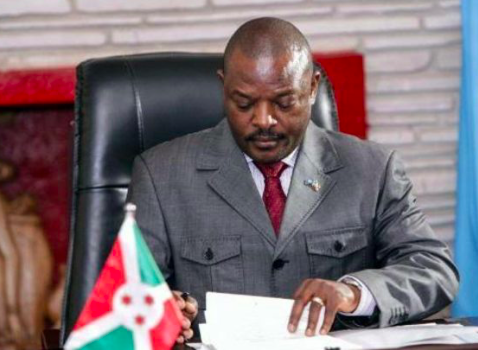Burundians were in shock Wednesday after the sudden death of their President Pierre Nkurunziza, with condolences pouring in from across Africa as the troubled country grappled with the complex legacy of his 15-year rule.
President Pierre Nkurunziza was due to handover to his hand picked successor in August and retire to a villa and a life time pay of $150,000 but he died June 8 after he suffered a heart attacked.
Flags in Burundi were lowered to half mast after the death of the 55-year-old leader, who according to the government died on Monday of a heart attack after feeling unwell for two days.
First lady Denise Bucumi, who medical sources say had been recovering from the coronavirus in a Nairobi hospital, flew back to Bujumbura late Tuesday, a source in the presidency told AFP on condition of anonymity.
Among African leaders, Tanzanian President John Magufuli praised Nkurunziza’s “strong leadership and his efforts to fight for peace, development and democracy” but critics regretted he had died without justice being served for rights abuses under his rule.
Nkurunziza, a fit sports enthusiast and evangelical who believed he was chosen by God to lead the East African nation, leaves behind a country in political and economic turmoil after his divisive rule.

AFP /Burundi
His 2015 run for a third term in office sparked protests and a failed coup, with violence leaving at least 1,200 dead while some 400,000 fled the country.
Nkurunziza had been due to step down in August after his surprise decision not to run in a May election, which was won by the ruling CNDD-FDD’s handpicked successor, Evariste Ndayishimiye.
Dignitaries and diplomats lined up to sign a condolence book at the presidency. Members of the ruling party were in shock after the news of Nkurunziza’s death.
“It is a catastrophe, it is as if the sky has crashed down on us. What will become of us without our supreme guide,” one party leader said, sobbing, on condition of anonymity.
Nyabenda had been Nkurunziza’s first pick to succeed him, but powerful generals in the ruling party chose Ndayishimiye instead.
However the government has yet to speak on how the transition will play out, and a cabinet meeting was called on Thursday to discuss this and the organisation of the funeral.
Worried for the future
Some in the country were gripped by anxiety over what comes next.
“I am very worried for the future of course, because we don’t know what is going to happen in the coming days, if the CNDD-FDD is not going to tear themselves apart over the leadership,” said Raoul, a young opposition supporter who works in a bank, and like many only gave his first name.
Gertrude, a teacher living in exile in Rwanda, said she had been “surprised” by Nkurunziza’s sudden death.
“I am not going to cry after everything he has done to us …. extrajudicial executions, torture and all of that, but I regret that he died before being judged for these crimes.”
Nkurunziza was a sports teacher who became a leader in the ethnic Hutu rebellion during the country’s 1993-2006 civil war with the minority Tutsi-dominated army. The war left some 300,000 dead.
He was elected by parliament as president in 2005 and re-elected in a general election in 2010.
His final years in office saw the country placed under sanctions and cut off by western donors, with Burundi ranked by the World Bank as one of the world’s three poorest countries.
Nkurunziza withdrew his country from the International Criminal Court in 2017, and last year shut down a local UN rights office which was probing killings, enforced disappearances and other rights abuses.
More recently Burundi expelled World Health Organization (WHO) staffers despite the coronavirus pandemic.
AFP

